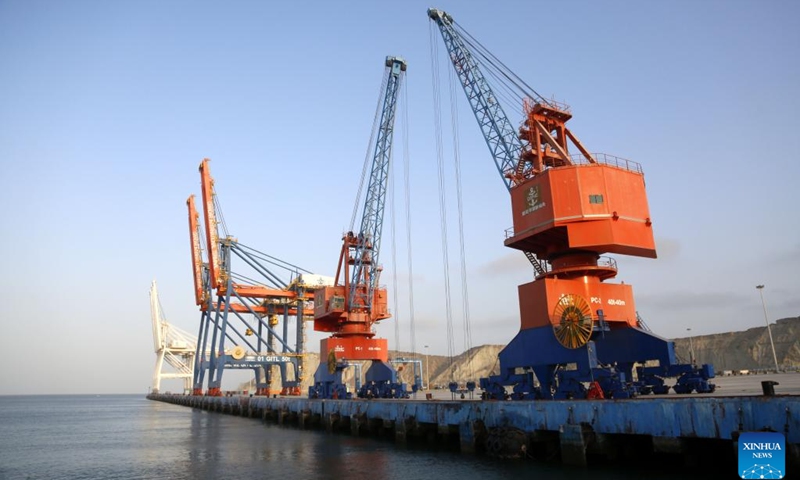
This photo taken on Sept. 18, 2024 shows a view of fishermen dockyard near the Gwadar port in Gwadar, southwest Pakistan. Launched in 2013, China-Pakistan Economic Corridor (CPEC), the flagship project under the China-proposed Belt and Road Initiative (BRI), is a corridor linking Gwadar port with Kashgar in northwest China's Xinjiang Uygur Autonomous Region, highlighting energy, transport, and industrial cooperation. (Photo: Xinhua)
Pakistan's eastern Punjab province is open for business and welcomes investment from Chinese companies, Maryam Nawaz Sharif, chief minister of Punjab province, told the Global Times in a group interview, following the Punjab Investment Conference held in Shanghai on Thursday.
She highlighted the potential of China-Pakistan cooperation across a wide range of sectors including new energy, agriculture and healthcare.
Over the past few days, Sharif, currently on an official visit to China, has been engaging with the business executives of some of the most innovative companies in sectors such as agriculture, healthcare, education, finance, automobiles, IT, artificial intelligence, e-commerce, semiconductors and robotics.
"I have come to China with an invitation that includes special incentives and possibilities for Chinese businessmen to invest in Punjab. We have already been overwhelmed by the response and are progressing discussions with some of these companies, even before the visit is over," Sharif said.
She noted that the Punjab Investment Conference is set to be a major milestone, showcasing the province's potential and announcing key collaborations across sectors.
"We have invited Chinese businessmen and Chinese businesses to explore opportunities in the province, focusing on a range of sectors. Punjab's strategic location, clear comparative advantage, skilled workforce and business-friendly policies, along with new policy reforms, make it an ideal place for global businesses to thrive and succeed," she said.
Punjab has emerged as an economic powerhouse, excelling in services manufacturing, and agriculture. Its geographical positioning and strategic connectivity make it a regional trade hub. Punjab has also been driving the China-Pakistan Economic Corridor (CPEC) through strategic energy initiatives, industrial development and improved regional connectivity, Mujahid Sherdil, Finance Secretary of Punjab said in his presentation when sharing the investment opportunity of Punjab at the investment conference.
Launched in 2013, the CPEC, a flagship project of the China-proposed Belt and Road Initiative, is a corridor linking the Gwadar Port in southwest Pakistan's Balochistan province with Kashgar in Northwest China's Xinjiang Uygur Autonomous Region. The project highlights energy, transport and industrial cooperation in the first phase, while the new phase expands to fields of agriculture and livelihood, among others, the Xinhua News Agency reported.
Sharif reaffirmed Pakistan's commitment to promoting high-quality development under the new phase of CPEC with a particular focus on renewable energy projects to build a China-Pakistan green corridor.
"The government of Punjab is committed to fostering partnerships with China and formulating environmental policies, adopting clean technologies and executing green initiatives," she said.
"Renewable energy remains a top priority for us. By working with Chinese partners, we are advancing our efforts to make clean energy more affordable and accessible," she added.
She also highlighted the potential of cooperation in terms of agriculture and healthcare.
"We have met with companies that are looking to invest in the modernization of our agriculture sector. This is a great example of how technology and investment can improve traditional industries and boost economic growth. In healthcare, the visit has led to possible partnerships that will bring advanced medical technologies to Pakistan," she said.
"Punjab is open for business and we welcome you to be our partner in the shared prosperity of our people," she added.



